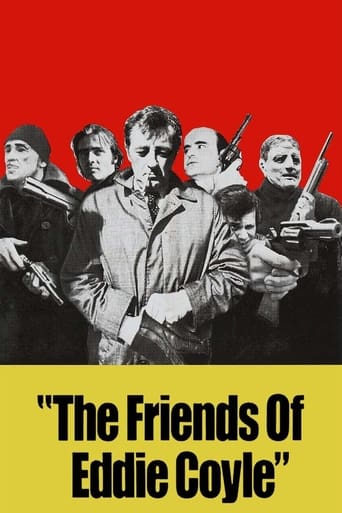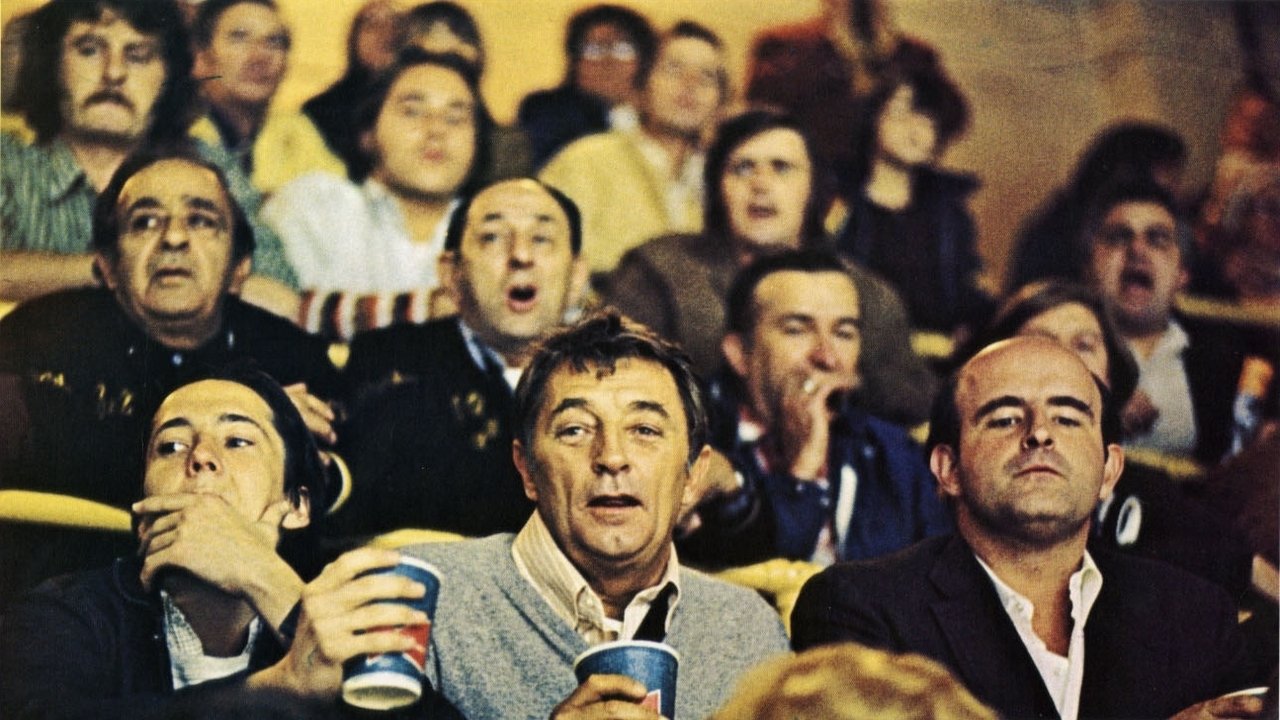Woodyanders
Burn-out minor league gun runner Eddie Coyle (superbly played with lived-in conviction by Robert Mitchum) ekes out a meager existence operating on the fringes of the Boston underworld. Coyle finds himself in a serious bind in which he either does some time in prison or else turns snitch for the authorities, thereby possibly incurring the lethal wrath of his nefarious cohorts.Director Peter Yates relates the gripping story at a leisurely pace, maintains a tough gritty tone throughout, makes excellent use of plain practical locations for extra authenticity (dingy bars, grungy diners, a noisy bowling alley), offers a vivid evocation of an utterly plausible drab, yet sordid workaday milieu, and expertly stages two cracking bank robberies. Paul Monash's astute script provides a very accurate, realistic, and unsentimental depiction of seedy low-life criminals who are strictly out for themselves and possess no code of honor whatsoever. The splendid array of first-rate character actors in colorful roles helps a whole lot: Peter Boyle as amiable bartender and freelance hit-man Dillon, Steven Keats as antsy punk hoodlum Jackie Brown, Richard Jordan as shifty hard-nosed treasury agent Dave Foley, Alex Rocco as the ruthless Scalise, Joe Santos as the scraggly Artie Van, Peter MacLean as hapless bank president Mr. Partridge, Jack Kehoe as Brown's weedy connection, Mitchell Ryan as Foley's stern superior, and James Tolkan as a pushy messenger. Kudos are also in order for Victor J. Kemper's sharp, but unflashy cinematography and Dave Grusin's spare bluesy score. A real corker.
octopusluke
As esteemed film critic Kent Jones explains in his excellent Criterion essay, The Friends of Eddie Coyle is "an inside job". Although this heist movie is sprinkled with two stifling bank robberies and a frenetic parking lot double-cross, director Peter Yates (who got in an early career best directing Steve McQueen in 1968′s Bullitt) manages to cause a stir in the film via an introverted look at old-timing gangsters and the new wise guys.Robert Mitchum is the titular Eddie 'Fingers' Coyle. A lifelong middleman gangster, he earns enough bread to keep his wife and two kids at home sweet. Needing to get his quick hands on thirty guns for a friend's big bank robbery job, he gets mixed up with bigmouth gunrunner Jackie Brown (Steven Keats). Whilst the heists go accordingly, ears are burning in the Boston underworld. At risk of heading back into jail after being caught drug smuggling, Coyle breaks the outlaws' code of conduct and grasses the names of his friend's to the nuisance detective, Agent Dave Foley (Richard Jordan) in a desperate attempt to keep his name in the clear. But the ears of the Boston Mafioso are burning and soon Eddie looks like he's in for white-knuckle trouble.Lifted from the George V. Higgins novel (which is also very good, FYI), screenplay writer Paul Monash manages to get some authentic swagger in the perfectly timed, heavy dialogue sequences, like when Detective Foley suggests to Coyle that "everybody oughta listen to their mother". It not only had me in stitches, but managed to validate and humanise everyone's greasy fingered pursuit.There's some great, beaten up performances here from some forgotten American greats. Peter Boyle is dynamic and unpredictable as the shifty local barman, and Coyle's only friend, Dillon, whilst the ruffled Steven Keats makes his feature debut as the gun smuggling Jackie Brown (ahem – namedrop!). Best of all, and perhaps unsurprisingly, is Bobbie Mitchum as the titular character. Slurring his way through a pitch-perfect accent (a rare attempt, throughout his career), the once lovable Hollywood rogue is clearly relishing the opportunity to become it's downtown elder statesmen. With flecks of grey, a looming hunch and wise, baggy eyes, Mitchum's depiction of Coyle as a man looking for rope is laconic, yet expressively wrought.It does have the same congested air of gritty Blaxploitation features like Super Fly, only the survivalism tactics exist now in a typically white, Boston vein. There's no moral judgement. The characters we expect to be pure evil are the do-gooding nice guys, whilst the meek prove the quickest to stab someone in the back. Unpredictable, and even with a few bum-note exchanges, The Friends of Eddie Coyle is a nuanced, melancholic portrait of the distinctly unglamorous American underworld.Read more reviews at www.366movies.com
Dave from Ottawa
Other reviewers have mentioned this film's very 70s look and concluded that it looks dated, but it doesn't really. Shot now, but set in the 70s it might look and play just the same. More a slice-of-lowlife character study than a crime thriller, the acting and writing are wonderful. Mitchum's character is world-weary in the extreme, Boyle is so duplicitous that he succeeds in deceiving himself and Richard Jordan hits just the perfect amoral note as an exploitative Fed who manipulates both of them with shaky promises and dirty deals. Boston itself, with its grungy urbanity is very well used and the dauntingly fortress-like architecture of Government Center seems an appropriately sinister nest for the conscience-less bureaucrats who work there. Here, none of the glamor visible in The Godfather is present. The criminal characters live quietly desperate, lower middle class lives and bungle along from one 'job' to the next. They are working stiffs whose métier is crime, and their world is a dark and unpleasant one. It was nonetheless a privilege to visit it.
treywillwest
This could be called one of the great neo-noirs of the 1970s. This will prove to be a strange opening sentence for this review as I will devote most of it to discussing why I don't think this film is really a "noir"at all. Noir- for all of its "grit"- is a romantic genre. The Noir anti-hero commits, in one way or another, a transgression in order to achieve transcendent love and passion, the hope of realizing the sublime. The noir protagonist is, then, truly an "anti-hero," or even "tragic hero." He has the potential for greatness, for sublimity, but this fate, by its very potential, is derailed due to some "tragic flaw" that is part and partial of the character's potential for greatness. Eddie Coyle, the ubiquitous main character and a small-time Boston gun-runner, has no potential for greatness. Judged simply by his actions, he's just a scum-bag in a world of scum-bags. That we come to both care for him and accept his fate with an almost cynical (in the classical Greek sense) acceptance is a major reason why this is such a great, and I think unique, work. It's greatness comes, if we want to get auteur-istic about it, not from the director or writer, but from the star, Robert Mitchum. Mitchum has long been amongst my favorite Hollywood performers, but I never knew he was capable of a performance like this. Few ever have been. Without the "showiness" of most celebrated Hollywood actors- say late period Dustin Hoffman or Jamie Foxx- Mitchum invents Coyle. He invents him more than the writer. This is a (rare in film) example of the performer as "auteur". If almost any other actor had played Coyle- as written- I think he could have come off as such a worthless slime-ball that most would be tempted to ask "why am I watching a movie about this pathetic, boring loser?" But Mitchum instills in Coyle a capacity for observance- for something akin to, though not identical with, empathy. He is, as Mitchum embodies him, someone who has suffered for his courage (which should not, in this case, be equated with honor) enough that he sees the fear and suffering in others, and he knows how to use it. But ultimately, he just doesn't want himself to suffer that much again. In this way, Mitchum makes Coyle almost a tragic, though not "noir"-ish(!)- figure, and this film one of profound pessimism. Coyle is humanity. In daring to face reality, he learns its horrific nature, and will do anything to escape it. But once understood, the real is the only real. We are trapped. Another note, the film has a brilliant sense of place. It captures not only Boston, but low-life New England in general, perfectly. I lived in the New England states for much of my teens and twenties. For me it was, especially in those months known for "Fall foliage!", a landscape of death and decay, though some claim to find it beautiful. This film transported me from Cali back to that wintry slum. I both admire it and resent it for this.



 AD
AD








